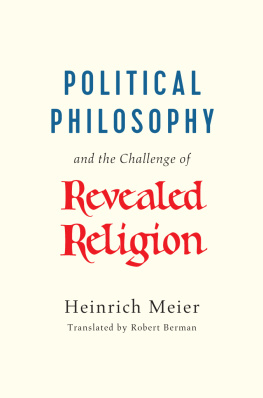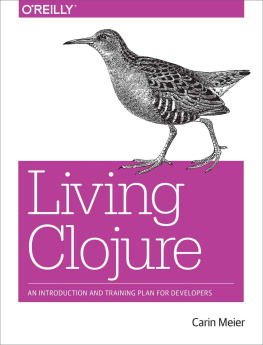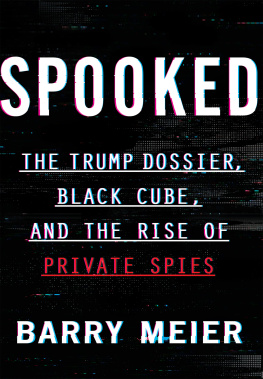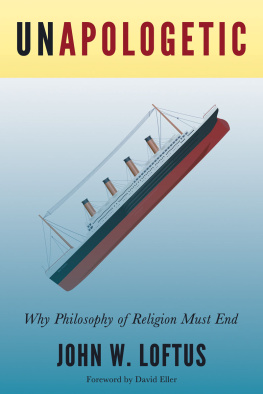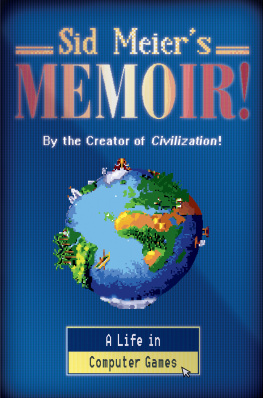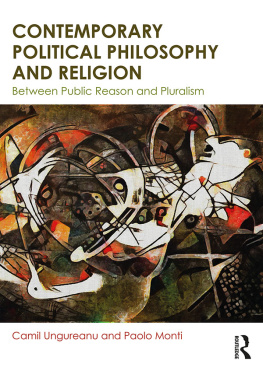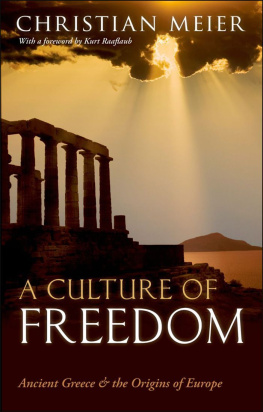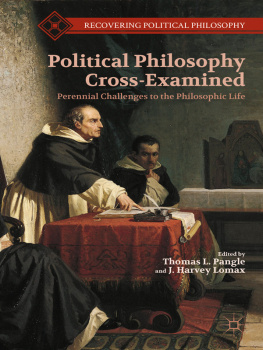Meier - Political philosophy and the challenge of revealed religion
Here you can read online Meier - Political philosophy and the challenge of revealed religion full text of the book (entire story) in english for free. Download pdf and epub, get meaning, cover and reviews about this ebook. year: 2017, publisher: The University of Chicago Press, genre: Religion. Description of the work, (preface) as well as reviews are available. Best literature library LitArk.com created for fans of good reading and offers a wide selection of genres:
Romance novel
Science fiction
Adventure
Detective
Science
History
Home and family
Prose
Art
Politics
Computer
Non-fiction
Religion
Business
Children
Humor
Choose a favorite category and find really read worthwhile books. Enjoy immersion in the world of imagination, feel the emotions of the characters or learn something new for yourself, make an fascinating discovery.
Political philosophy and the challenge of revealed religion: summary, description and annotation
We offer to read an annotation, description, summary or preface (depends on what the author of the book "Political philosophy and the challenge of revealed religion" wrote himself). If you haven't found the necessary information about the book — write in the comments, we will try to find it.
Meier: author's other books
Who wrote Political philosophy and the challenge of revealed religion? Find out the surname, the name of the author of the book and a list of all author's works by series.
Political philosophy and the challenge of revealed religion — read online for free the complete book (whole text) full work
Below is the text of the book, divided by pages. System saving the place of the last page read, allows you to conveniently read the book "Political philosophy and the challenge of revealed religion" online for free, without having to search again every time where you left off. Put a bookmark, and you can go to the page where you finished reading at any time.
Font size:
Interval:
Bookmark:
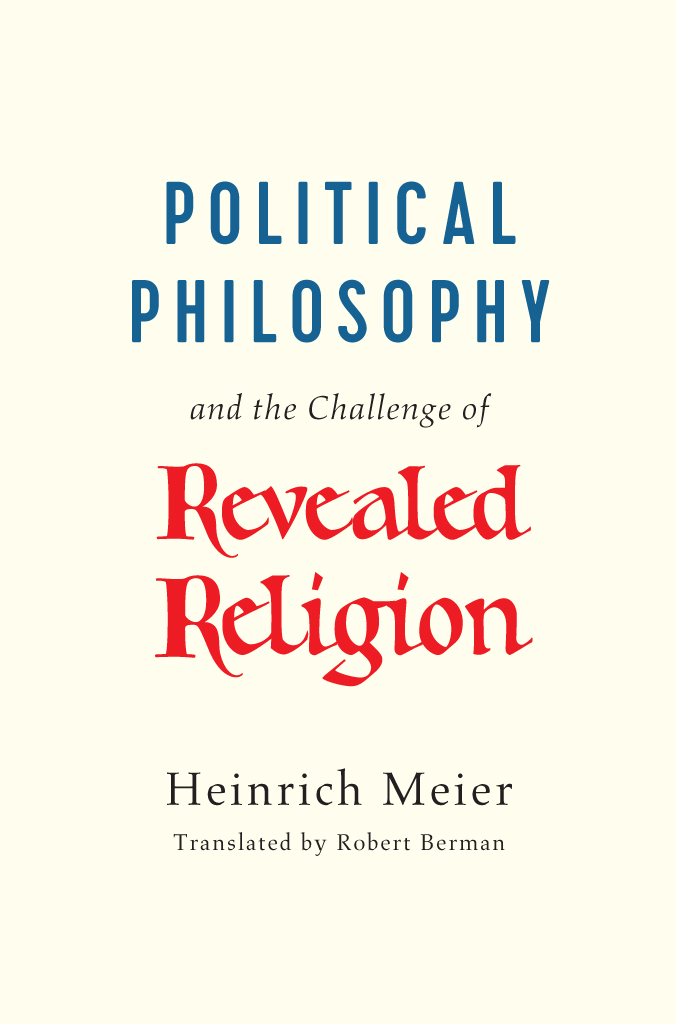
HEINRICH MEIER
Translated by Robert Berman
THE UNIVERSITY OF CHICAGO PRESS
CHICAGO AND LONDON
The University of Chicago Press, Chicago 60637
The University of Chicago Press, Ltd., London
2017 by The University of Chicago
All rights reserved. Published 2017.
Printed in the United States of America
26 25 24 23 22 21 20 19 18 17 1 2 3 4 5
ISBN -13: 978-0-226-27585-7 (cloth)
ISBN -13: 978-0-226-27599-4 (e-book)
DOI : 10.7208/chicago/9780226275994.001.0001
Originally published as Politische Philosophie und die Herausforderung der Offenbarungsreligion by Heinrich Meier, Verlag C.H.Beck oHG, Mnchen 2013
The translation of this work was funded by the Thiel Foundation.
Library of Congress Cataloging-in-Publication Data
Names: Meier, Heinrich, 1953 author.
Title: Political philosophy and the challenge of revealed religion / Heinrich Meier ; translated by Robert Berman.
Description: Chicago ; London : The University of Chicago Press, 2017. | Translation of: Politische Philosophie und die Herausforderung der Offenbarungsreligion. | Includes index.
Identifiers: LCCN 2016006709 | ISBN 9780226275857 (cloth : alk. paper) | ISBN 9780226275994 (e-book)
Subjects: LCSH: Political sciencePhilosophy. | Philosophy and religion. | Strauss, Leo. Thoughts on Machiavelli. | Rousseau, Jean-Jacques, 17121778. Du contrat social. | Political theology. | Religion and politics.
Classification: LCC B 65 . M 4513 2013 | DDC 320.01dc23 LC record available at http://lccn.loc.gov/2016006709
 This paper meets the requirements of ANSI / NISO Z 39.48-1992 (Permanence of Paper).
This paper meets the requirements of ANSI / NISO Z 39.48-1992 (Permanence of Paper).
The present book sets out to determine political philosophy as a philosophic concept and to test it face to face with the challenge posed by revealed religion. It is guided by the insight that philosophy must prove its right and its necessity in confrontation with the most powerful objection that can be raised against philosophy, and it asserts that this confrontation is the officium of political philosophy. As little as philosophy is understood here as an academic discipline or as a province in the realm of culture, just as little is political philosophy understood as a special department or as a field in the garden of philosophy. Instead, it is a distinctive turn, a change in the direction of view and inquiry, which for philosophy makes a difference in the whole. For philosophy can reach its full reflexivity solely in the reflection on its own presuppositions and in the encounter with its most demanding alternative. The first part of the book specifies the concept of political philosophy in its fourfold determination: according to its object, the political or human things; as a mode of philosophy or in view of the political defense of the philosophic life; in regard to the rational justification of the philosophic way of life; and finally, uniting these three determinations, as the locus of the philosophers self-knowledge. The four moments are so intertwined with one another that they constitute an articulated and internally dynamic whole that is historically diverse and nevertheless maintains its inner unity. In the second and third parts, the concept is developed further through the interpretation of two masterpieces of political philosophy.
At the center is a thorough investigation of Leo Strausss most complex and controversial book, Thoughts on Machiavelli. Strauss, who introduced the term political philosophy into philosophic discussion, links in his longest work the problem of Socrates, which designates the starting point of political philosophy, with the problem of Machiavelli, which names the beginning of modern political philosophy. Between Socrates and Machiavelli stands the theological and the political challenge of revealed religion, about which Strauss has presented with Thoughts on Machiavelli the most astonishing treatise.
The third part contains a new interpretation of Jean-Jacques Rousseaus Du contrat social. By a precise explanation of the argument and the structure of the writing, it is shown that Rousseaus most famous work cannot be adequately understood as long as it is not understood as a coherent political-philosophic response to the conception of theocracy in all of its manifestations. No other book of a philosopher in modernity achieves the clarity with which Du contrat social determines the right and the limits of politics.
Why Political Philosophy? has its origin in the inaugural lecture that I gave on February 16, 2000, in the Great Hall of Ludwig-Maximilians-Universitt in Munich. It appeared as an independent writing in two editions in 2000 and 2001 and was translated into five languages. The German original has been out of print for quite some time. The two chapters that substantiate the programmatic outline from the year 2000 were written especially for this book. I worked out The Renewal of Philosophy and the Challenge of Revealed Religion in two seminars on Thoughts on Machiavelli that I taught at Ludwig-Maximilians-Universitt in Munich in summer 2010 and in the Committee on Social Thought of the University of Chicago in spring 2011. The Right of Politics and the Knowledge of the Philosopher was prepared by a seminar on the Contrat social in Chicago in spring 2012. Parts of sections I and II I presented in public lectures at the University of Halle, the University of Zurich, and the Free University of Berlin in September, October, and December 2012. I have been preoccupied with the Contrat social since 1974. I devoted two of my Rousseau seminars in Munich to it, one in winter 2000/2001, the other in summer 2006, and long before this it was the subject of a seminar that I conducted jointly with Wilhelm Hennis at his invitation at Albert-Ludwigs-Universitt in Freiburg im Breisgau in summer 1980. Thoughts on Machiavelli has accompanied me since I first read it in October 1977. It is one of the books that challenge and reward the reader day and night.
Chicago, April 8, 2013
H. M.
Chapter I is a revised and updated version of Why Political Philosophy?, first published as translated by Marcus Brainard in the Review of Metaphysics 56, no. 2 (December 2002).
The English translations of Rousseaus French in chapter III rely in the main on The Social Contract and Other Later Political Writings, edited by Victor Gourevitch (Cambridge, 1997). On occasion, however, when conveying the authors own German translations of Rousseaus French, the English translation here may deviate from Gourevitchs renderings, reflecting instead those of the author.
The aim of the translation, from the first to the last word, has been to eliminate to the vanishing point the distance between English and the authors German in which he has presented his thought so that the reader experiences the language that is foreign to the author as if it were his native tongue.
The abbreviation P. and the term Footnote refer, respectively, to pages and footnotes in this writing. The abbreviations p. and n. are used for references to pages and notes, respectively, in other publications.
The picture I have briefly sketched of the pre-Socratic philosopher in the
Font size:
Interval:
Bookmark:
Similar books «Political philosophy and the challenge of revealed religion»
Look at similar books to Political philosophy and the challenge of revealed religion. We have selected literature similar in name and meaning in the hope of providing readers with more options to find new, interesting, not yet read works.
Discussion, reviews of the book Political philosophy and the challenge of revealed religion and just readers' own opinions. Leave your comments, write what you think about the work, its meaning or the main characters. Specify what exactly you liked and what you didn't like, and why you think so.

